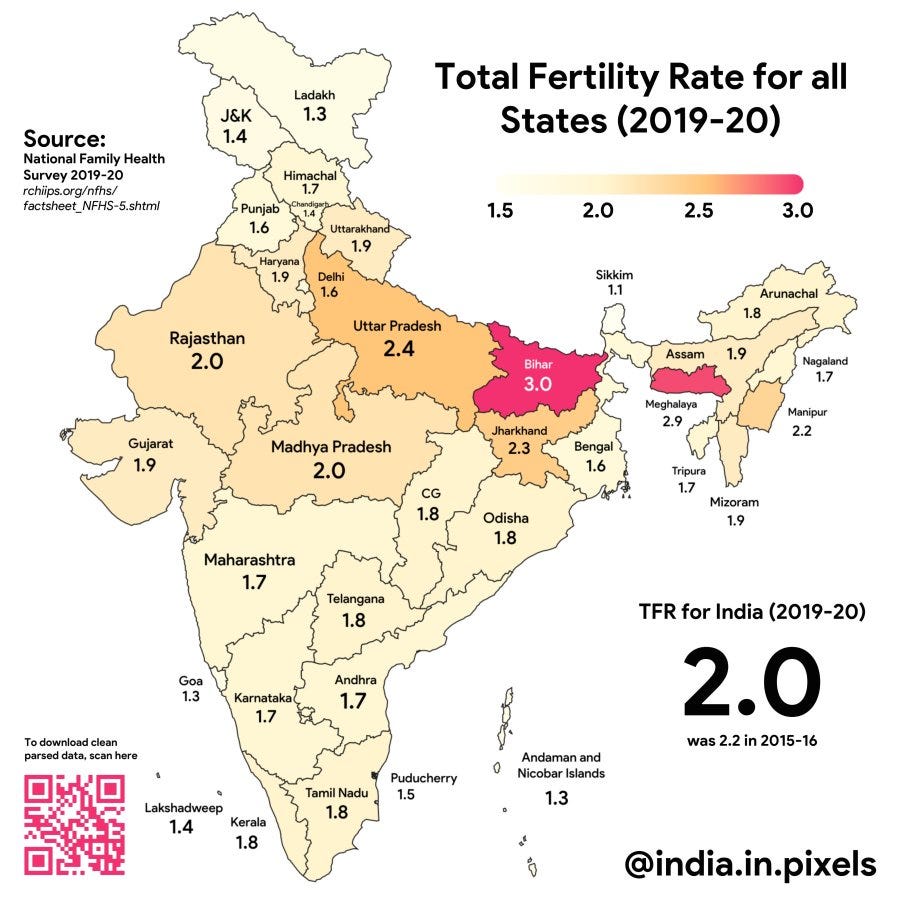The age of the old
Demographic changes and their implications?
In case you haven’t noticed, couples around the world are having lesser children. In 1960 the fertility rate around the world was around 5. As of 2019, that has dropped down to 2.4. One of the obvious reasons for this was the invention of the pill. That happened in 1960. Another huge factor for the same is the drop in the child mortality rate.
Since then, we have also seen an improvement in women's participation in the workforce. As we move towards a more egalitarian society, women are more likely to wait until they are established in their field before having children. As couples decide to start a family late, it’s only natural that the fertility rates drop.
We have also seen unprecedented inflation in college fees around the United States. According to data from the US Bureau of labors statistics, from the 1980s to 2020, while US inflation has been around 228%, college tuition inflation has grown by 1184%. Not encouraging signs if you are planning to start a family. Whatever the reasons, fertility rates have been dropping in most parts of the world and what’s crazy is that this could well be an irreversible change. Barring any world wars, natural disasters, and epidemics that significantly impact and wipe out the world population, it seems quite likely that these low fertility rates are here to stay.
While fertility rates have been dropping healthcare has improved leaps and bounds across the world. In 1970 the average life expectancy in the world was 58. That as of 2020 has jumped to 72.
Simply put people are having lesser children and are living longer. That is bound to lead to a trend where the number of people above the age of 65 is growing and that is exactly what we are seeing worldwide.
As of 1960 close to 5% of the world, the population was above the age of 65. As of 2020 that number has moved up to 9.2% and is only expected to increase. According to UN estimates by 2050 close to 16% of the population may be above the age of 65.
So, what does a bunch of old people around the world mean for the world?
Disease Dependency
The worst part about getting old is deteriorating health. For instance, in the UK about two in 100 people aged between 65 to 69 have dementia, and this figure rises to one in five for those aged between 85 to 89. (Source)
As we grow older we will also need to rely on younger people to take care of us. The dependency ratio is a measure of the number of dependents aged zero to 14 and over the age of 65, compared with the total population aged 15 to 64. That is expected to increase too.
Given that demand for healthcare rises with age, countries with rapidly aging populations may have to allocate more money and resources to their healthcare systems. This may also mean that we see an increase in nursing homes, community living, etc.
Slower Economic Growth
As working-age people spend more time and money to support the elderly, and as the % of retired individuals in an economy increases, we will see lower labor force participation. This may very well lead to slower economic growth.
Inflation?
Could we see a resurgence of inflation due to an aging population? That is a question far out of my expertise to comment upon. However, economists C.A.E. Goodhart and Manoj Pradhan believe so.
In a paper and book titled “The Great Demographic Reversal: Ageing Societies, Waning Inequality, and an Inflation Revival” they mention that, “ The young and old, who are not working, consume, but do not produce. Therefore, they increase demand relative to supply.”
As we know, an increase in demand which is not met with an increase in supply can be inflationary and in this case, could lead to wage inflation. For more on this, it would be worth reading their book.
Changing Preferences
My mother was under the impression that me playing Fifa every week was a teenage phase which would go away. Much to her dissapointment this phase has carried on, and Im sure it will remain even when I am 60.
What I am trying to highlight here is that we cannot simply assume that we will do the exact same thing that 60 years olds do today. Ofcourse chances are we are going to have similar health issues and money will be spent on that sector but that may not apply to overall spending patterns.
New Industries (like gaming) will emerge that may not be limited to younger people. Furthermore, companies will have to adapt a lot of their marketing as it won’t be limited to the younger people.
African Baby Boom
While we are seeing slow population growth in most places, Sub-Saharan Africa’s population is still increasing quickly. Its population is projected to grow from 1.3 billion in 2020 to 2 billion by 2038 and 3 billion by 2061. (Assuming no major disasters)
Despite Africa’s size, it is still a net importer of food and hence feeding this ever-increasing population will be a challenge but also an opportunity.
Not only will the continent have to increase agricultural productivity, but also drastically increase the amount of land that is currently being used for agriculture. According to the World Bank estimates, African agriculture will become a trillion-dollar sector by 2030.
What is up in India?
India is not going to be hit as badly as other European countries (at least immediately) due to an aging population. However, it’s worth highlighting that fertility rates in India too have been reducing quickly.
The ministry of health and family welfare conducts a survey every year to gather information on the population. In that, they found that the fertility rate had dropped to 2.

Compared to 2016, the only 2 states that actually saw an increase in fertility rates were Kerala and Tamil Nadu. India’s working-age population growth rate also dropped from 2% in 2010 to 1.5%. Is India moving away from its demographic sweet spot? Probably, but it’s still a lot better than most countries in the world.
For more on demographics, you could consider reading -
2030: How Today's Biggest Trends Will Collide and Reshape the Future of Everything by Mauro F. Guillén
The Rise and Fall of Nations by Ruchir Sharma
The Great Demographic Reversal by Charles Goodhart and Manoj Pradhan
I apologize for not being regular with the newsletters. If you have any suggestions, do reach out on Twitter. Thanks for reading!





